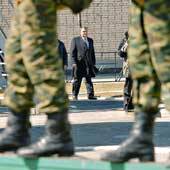Are you back in the army
 Russia refuses high-quality professional army. Such a conclusion can be drawn from a number of statements by representatives of higher generals.
Russia refuses high-quality professional army. Such a conclusion can be drawn from a number of statements by representatives of higher generals.General Vasily Smirnov, head of the General Organization and Mobilization Directorate of the General Staff, proposed at a hearing in the Federation Council to raise the upper bar of the draft age from the current 27 years to 30, reduce the number of universities providing deferment from the army, call upon students after the second year. He would like to recruit recruits almost year-round, postponing the end of the spring draft from July 15 to August 31 (April 1 starts, October 1 to December 31 autumn call), and order recruits to come to military enlistment offices without summons under the fear of criminal prosecution.
Chief of the General Staff Nikolai Makarov soon corrected his subordinate. The Ministry of Defense is discussing the extension of the draft age, but not so radical (28? 29?). The ministry does not intend to edit laws to reduce the number of student deferments and the number of universities with a military department. Makarov doesn’t know the topic or is cunning: the government can reduce the list of civilian universities and academies whose graduates do not serve in the army without legislative changes. However, the Defense Ministry’s draft law has been prepared and is in the government. The general who wished to save incognito told Nezavisimaya Gazeta that the proposals of the military were approved by the Kremlin.
Arguments that lead generals are not new. There is a shortage in the army, too many deferments, the number of draft dodgers is growing, and the approaching demographic crisis will completely bleed the army. To some extent, the Ministry of Defense, by extending the draft age and conscription time, wants to compensate for the very recent reduction of the service life to one year (from 2008).
Realization of the intentions of the generals will mean that the recruitment of the Russian army returns to the Soviet models 1980-s. Until the decree of Mikhail Gorbachev in May 1989, which canceled the recruitment for full-time students, almost a conscription after the summer session was the norm. However, even during the Soviet era, young people older than 27 did not join the army for years.
This return is obviously caused by the failure of the army’s transition to a contract-based program. In February, General Makarov bluntly stated: “We are not switching to a contract basis. Moreover, we increase the call, and reduce the contract part. "
In 2003, the federal target program “Transition to recruitment by military servicemen undergoing military service under contract, a number of formations and military units” was adopted on 2004-2007. She envisaged that the number of contract soldiers and sergeants in constant readiness units would grow from 22 100 in 2003 to 147 000 in 2008, and their total number from 80 000 to 400 000. In fact, in 2008, in the units of constant readiness, there were 100 000 contract soldiers, their total number in the army did not exceed half of the target - 200 000. The program failed. And it’s not just money: the program’s funding has increased from the initial 79 billion to 100 billion, of which 84 billion was mastered. It turns out that the generals could not fulfill (or sabotage) the orders of the country's top political leadership in peacetime. Who can guarantee that general disobedience will not happen again in an emergency?
The Ministry of Defense could not organize and make attractive professional service in the army and sees a way out in closing the resulting hole with an increase in the number of draftees. It is clear that the quality of these soldiers, called up for a year, will be lower than the quality of contract soldiers.
The rejection of the transition to a professional army promises many sad consequences for the future of Russia. Calling 27-29-year-old college graduates who have become popular professionals can cause significant damage to the economy and put an end to the modernization of the country. Many promising specialists will prefer a one-year career break to go abroad. It is curious, for example, to look at the work of the draft board in the Skolkovo innovation city (however, if there is a police station there, why not create your own army?).
Information